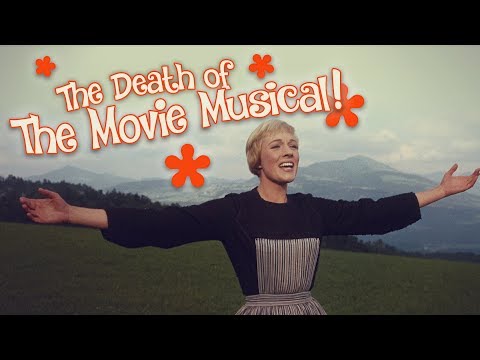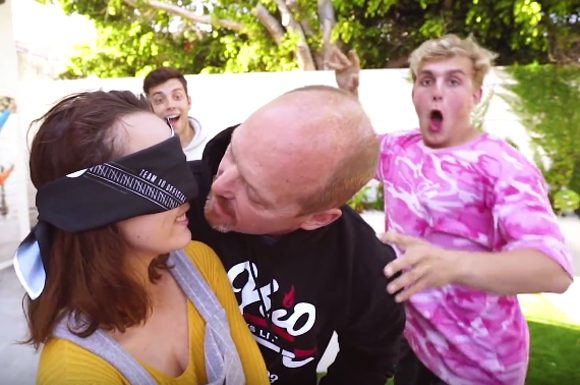
There were a lot of event movies to talk about that have come out in 2018 that echo trends that have shaped our cinematic past But there was one movie this year that is truly the embodiment of the modern epoch
One movie that some have described as the most ambitious crossover of all time One movie that built so skillfully on the cinematic universe that came before it One movie that is the defining moment of our era I'm talking of course about (LINDSAY VO) Mamma Mia: Here We Go Again SINGING: Mamma Mia, here I go again (LINDSAY VO) Oh boy, the great American musical is back! But, ehhhhh? I mean, on the one hand, high time cultural-milestone-voice-of-a-generation for wine moms Mamma Mia got a sequel CHER: You know, Soph, being a grudge-holder makes you fat? But here's the thing, fam
On top of movie pass going bankrupt it's a streaming world now I don't like going outside, and I really don't like giving my undivided attention to things And this newfound medium of streaming is reducing interest in "The Cinema" I need a gimmick to get my ass out of the house and drive the whole 12 miles down to the Rolling Hills AMC so I can see the latest release in 4k 3D
If we have enough gimmicks then surely interest in "The Cinema" will revive or will it? (LINDSAY VO) So obviously the Hollywood panic of trying to incentivize people to stop watching goddamn stranger things on Netflix for the fifth time and to come on out to the movies by pushing the prestige of gimmicks like 3D, 4D, and even 6D applies more to big-budget tentpoles like superhero movies, superhero movies, live-action remakes of Disney classics, and even superhero movies more than it does the Hollywood musical (SINGING) Here I go again! But that hasn't always been the case
(LINDSAY VO) A long time ago, way back, back in those halcyon days before Valerian and the City of a Thousand Planets I had a segment in my video about Joel Schumacher's Phantom of the Opera alluding to the crash and, ultimately, the final dumpster fire resting place of the big Hollywood movie musical, namely, Hello Dolly But the fall of the great American musical was, of course, much more complicated than just one movie not making its money back And that is what we're going to talk about today (LINDSAY VO) Because in many regards, the dramatic annex of death throes of the big Hollywood musical in the 1960s had more in common with our current day endless glut of sequels, remakes, and superhero movies than it does with Mamma Mia! Here We Go Again There was a time when musicals were the biggest game in town
It was a world dominated by Rodgers and Hammerstein, by Julie Andrews, by Gene Kelly For decades, the saccharine Broadway-style musical was the event movie These were the tent poles of the mid-20th century until one day, it all came crashing down (LINDSAY VO) With the advent of talkies it wasn't long before musicals found their way onto the big screen First through musical shorts featuring popular performers and eventually full-length features
Ever since the advent of sound, musicals were a consistently popular staple But in 1939, MGM Studios hired producer Arthur Freed, whose production unit went on to create what would eventually become the golden era of movie musicals, with titles like Easter Parade, On the Town, Singing in the Rain and an American in Paris And in the 1950s and early 1960s, the way musicals built hype around their big important movies was the Roadshow So what is a Roadshow? And how does it fit in here? Wellit's a gimmick But a gimmick that was–particularly through the 1950s to the 1970s– used to promote more prestige oriented films You got your historical epics, your gut-wrenching war dramas, and, of course, the larger-than-life musical (WEST SIDE STORY, SINGING) Life is alright in America! IF you're all white in America! (LINDSAY VO) Your 'The Day the Earth Stood Still's and fluffy beach blanket bingos could ne'er dream of having a Roadshow release
But your Ben Hurs, Your Doctor Zhivagos, and your West Side story's made for prime fodder Basically before the film goes into wide release a studio would take it on the road for a limited premium release MARIA: How many can I kill, Chino? How many? And still have one bullet left for me? (LINDSAY VO) Ticket prices were at a premium compared to your average film screening but the marketing appealed to a more luxuriant experience To quote Mike Todd, the leading purveyor of roadshows in the 1950s: "To show [audiences] got class and appreciate the arts, they'd be insulted if you didn't charge premium prices and make it a little hard to see This way they don't have to rub elbows with the gum chewers
" Roadshow movies were usually longer than your average release, did not include any shorts or trailers in front of them and almost always had an intermission You can see this last element parodied in later movies like Monty Python and the Holy Grail Roadshow movies were presented with pre-recorded overtures, entr'actes, and exit music to mimic an actual night at "The Theater" (LINDSAY VO) They almost always included number of souvenirs and accoutrement for audience members to take home with them, including programs, pins, and all sorts of licensed merchandise So if you're wondering who the *BLEEP* would ever buy twelve dollar Infinity War popcorn bucket, well, there is a precedent for that sort of thing And to be clear roadshows were not only for movie musicals
(LINDSAY VO) Gone with the Wind saw massive success with the road show marketing campaign Just that the format of the musical lent itself well to the road show, making them a most common, and often, the most popular In effect, to buy a ticket to a road show movie was to build prestige around the movie, to make it feel more like an evening night or a Broadway show than just celluloid print And if this sounds like a really expensive ploy to get butts in the seats– It's cuz it is Which is why most of these films had a road show and a limited release, and ended up getting a theatrical cut wide release to most mainstream movie theaters
But, a successful roadshow garnered not only premium ticket sales and more rentals from regular theaters but also great word-of-mouth for wide release, making them, best-case-scenario, a risky but profitable marketing method (LINDSAY VO) So this marketing strategy works well for big-budget movies for decades and all seems well and good But as movie studios were throwing this promotion at everything and anything being made, well as hitting almost toddler levels of managing film budgets themselves, comes the 1950s, and there's a new game in town (OLD AD) When you can get this wonderful new 17-inch Westinghouse set at a modest price– But here's the thing, fam On top of the Communists ruining everything, it's a television world now
I have TV dinners to make, and going to the movies makes it really hard to milk any sweet drops of affection from my loveless marriage I don't want to haul ass all the way out of the house and drive 12 miles to Los Angeles, to the Cathay Circle Theater Why would I pay more to see a movie that's going to get a wide release in a few weeks anyway when I can watch Bonanza on the television from the comfort of my own home? (LINDSAY VO) Some recognize the increased dependency on huge roadshows as a dangerous game According to Films and Filming in 1963: "Should these gigantic investments achieve the desired outcome, Hollywood may well have found the definitive and triumphant answer to the threat of television Should they encounter defeat the whole face of the film industry may be drastically changed
Will the public pay the higher prices made necessary by these colossal expenditures? Is there an audience sufficiently large to permit these pictures to emerge without a loss? How many of these fabulously expensive films can and will film goers absorb?" Around the same time, a string of expensive movie bombs nearly sink entire movie studios (LINDSAY VO) The most infamous from this era being 20th Century Fox's Cleopatra, a bomb of such gigantic proportions that it nearly tipped the studio into complete bankruptcy Throw in the nascent cultural changes of the early mid-60s, and studios are starting to realize that the whole concept of the roadshow just wasn't worth the investment anymore An aging relic that signaled it was time to let go and move on And then
something unexpected happened Winds in the Eastmist coming in (BERT, MARY POPPINS, SINGING) Like something is brewing, about to begin
Can't put my finger on what lies in store but I feel what's to happen all happened before– (LINDSAY VO) The Hollywood movie musical looks like it might be on its deathbed, and who should come along to revive it but Walt Disney and Mary Poppins The film launches Julie Andrews' film career, ironically after her getting snubbed from being cast in the role she originated on Broadway with My Fair Lady And it won a ton of Academy Awards, including Best Actress for Andrews Mary Poppins cost a relatively low 52 million dollars to make, and it returned that amount at the box office quickly
And though it did not run as a roadshow feature in the United States it did in London to great success More over the film was doing equivalent business to a roadshow release, and Poppins was what really convinced Disney that he should enter the roadshow musical business We'll get to that (MY FAIR LADY, SINGING) I could have danced all night, I could have danced all night– (LINDSAY VO) Then there was Warner Brothers' My Fair Lady, the most expensive–at the time–production for the ailing studio which was about to be up for sale at the time They cast Audrey Hepburn as Eliza Doolittle– (ELIZA) Come on, Dover! Move your blooming arse! (LINDSAY VO) a big star with a weaker voice to replace the Broadway originator of the role, Julie Andrews
And not only does the roadshow gambit pay off with a huge hit, it nets eight Academy Awards– (GREGORY PECK) The best picture of the year is My Fair Lady (LINDSAY VO) But then, oh boy, here comes the big guns! (JULIE ANDREWS, SINGING) The hills are alive, with the sound of music (LINDSAY VO) The Sound of Music is a big 1950-style musical smack in the middle of the 1960s And it does record box office numbers for a roadshow feature The Sound of Music effectively single-handedly reversed the box office disaster 20th Century Fox had with Cleopatra So when it looked like the big musical juggernaut was finally dying as the event movie trend in Hollywood, three big box office musical smashes happened one right after the other, along with a wave of prestige that seemed to back up the phenomena My Fair Lady, Poppins and Music were nominated for combined 35 Oscars and garnered a total of 18 wins
And studios Lose Their Shit So what do they do in the face of these massive successes? You got to chase that trend! But, the earlier prevailing wisdom was that road shows and big bawdy 1950s style Hollywood musicals were on their way out And that was not wrong They were very much on their way out But studios were going to ignore this to their own downfall
(LINDSAY VO) According to film historian Matthew Kennedy, "in the seven years that followed The Sound of Music it became de rigueur for any film musical to be released in the roadshow format if they wanted to be rightfully labeled 'major', 'important', or 'lavish'" The first canary in this coal mine actually came from the Disney Company with The Happiest Millionaire, a roadshow release completed after Walt's death that bombed so spectacularly you've never heard of it But this wasn't a huge investment, and it didn't tank the studio Other studios did much, much worse (SINGING) Camelot! (LINDSAY VO) Warner Brothers wants to recapture the success of My Fair Lady with another popular Broadway musical vehicle, Lerner and Loewe's Camelot, a romantic love triangle story based on T
H White's The Once and Future King and a personal favorite of the Kennedy family It was, by all accounts, the production from Hell (LINDSAY VO) Super expensive attention to detail of historical accuracy inflates the budget and causes delays
It featured the cast mostly from Hell, namely its star Richard Harris who was drunk to a point of liability onset and constantly in giant fights with the producers Its third party star as Lancelot, Italian actor Francis Nero, barely speaks English and the production is plagued by delays Most of its tremendously costly shoot in England is unusable and all of this is going down while Warner Brothers is being sold and the studio is basically like, *BLEEP* it, whatever, just get it done Ultimately the film ends up costing fifteen million, making it the second most expensive Warner Brothers production after My Fair Lady And in the midst of all this, Roadshow prices are flipped up from $2 to $6
And as we all know raising prices for the exact same product for no reason to see the exact same thing is a great way to get butts into seats (LINDSAY VO) Critical response to Camelot is dire Whereas The Sound of Music got ripped hard for its sentimentality but not much else, Camelot is almost universally panned, not just for its dated sense of traditionalism and sentimentality, but for a lot of technical reasons Also in contrast with musicals like The Sound of Music no one gave a *BLEEP* about Camelot the musical before the film version, it having closed on Broadway in 1963 after a modest three-year run It didn't have the fervent fan base of other Broadway shows, nor did it have any artistically inspired moments a la Mary Poppins
And by 1967 movies like this are starting to feel like a relic (LINDSAY VO) By this point movies like Who's Afraid of Virginia Woolf, Bonnie and Clyde, and Help! are revolutionizing cinema But these movies are new, unpredictable and Studios wanted to continue sinking their money into what up until this point had been considered safe (REX HARRISON) It's incredible It's impossible
But it's true A man can talk to the animals! (LINDSAY VO) Hey, people liked Rex Harrison in My Fair Lady, and people loved Mary Poppins Why not create an original musical based on an English children's book series that's also a vehicle for Harrison? At the time Doctor Dolittle seemed like a good idea? Given that a more child-friendly musical with a large cast of animals would reach a larger audience and also be ripe for the picking when it came to toy tie-ins But we have a problem, Rex Harrison is a giant pain in the ass who like Richard Harris is tremendously difficult to work with, so Harrison leaves the film and Christopher Plummer is brought on But then, hey, Rex Harrison wants back in and the studio is still contractually obligated to pay Plummer his agreed-upon salary
There was also the constant recasting of Bumpo the Prince of a fictional African Kingdom– Yikes Bumpo was originally supposed to be played by Sammy Davis Jr whom Harrison refused to work with Said Harrison, "I don't want to work with an entertainer, I want an actor, a real actor, not a song-and-dance man" But eventually the part was finally reduced, given to relatively unknown character actor Geoffrey Holder who had his name changed to
William Shakespeare the 10th God, this just keeps getting weirder Oh, and animals
Oh, animals 2 million dollars of the budget were allotted to the animal related costs, quarantine fees, which included a lot of giraffe related mishaps Between one dying on set, trying to get Rex Harrison to ride on one, and a three-day production delay that happened when, according to Dolittle choreographer the giraffe stepped on his own cock The film ended up costing 18 million, triple the original budget, and the final result isa mess (LINDSAY VO) The roadshow for Dolittle became more of a focus group They were editing it as they were taking it on the road, trying to trim it based on audience reaction, which was tepid to negative throughout All this to say nothing of the exorbitant amount of merchandising that accompanied the movie with over 300 official pieces of Doctor Dolittle swag from bikinis to pudding mix worth 200 million dollars, little of which sold
To quote a Fox promotion staffer years later, "That *BLEEPING* Doctor Dolittle killed off merchandising tie-ins" (NERVOUS LAUGHTER) For now (LINDSAY VO) In the end box office and critical response murdered Doctor Dolittle with the movie only grossing 9 million of its 18 million dollar budget, and it being derided as a boring movie laced with a white man's burden narrative and cartoonishly racist stereotypes of Africa It's legacy is perhaps summed up best by producer Robert Zanuck; "You look back now and ask 'how could you have been so stupid?' Doctor Doolittle was conceived in a period of euphoria we were riding a musical wave that we didn't realize was going to come crashing down in the beach all at once Sure they were probably signs and warnings out there, but you were already so committed financially and emotionally that's very hard to pull the plug on these big undertakings
" Other films like Finian's Rainbow, Paint Your Wagon and Man of La Mancha also underperformed during this weird glut period But none landed with such an expensive thud as– (LOUIS ARMSTRONG SINGING) Well hello, Dolly This is Louis– (DOLLY: Hello Louis–) (LOUIS ARMSTRONG, SINGING) Dolly (LINDSAY VO) On paper, Hello Dolly! seemed like a natural for film adaptation A light-hearted romantic comedy that swept the Tony Awards in 1964 with a then record-breaking 10 wins
The casting of Barbra Streisand was bolstered by the success of Funny Girl a year before the film's release– (FUNNY GIRL, SINGING) Don't! Tell me not to live, just sit and putter, life's candy and the sun's a ball of butter, (LINDSAY VO) –cementing Streisand as America's darling But even then the studio was ignoring how miscast Streisand was Dolly Levi is supposed to be like middle-aged, she's in her 50s, and at the time Barbra Streisand was 25 (LINDSAY VO) The casting choice also snubbed Broadway role originator Carol Channing– (DRAG RACE CLIP) So much talk about drugs I haven't taken anything but Lipitor for the past 10 years (LINDSAY VO) —for a younger hotter actress in the title role, resulting in a Channing/Streisand feud that was arguably more interesting than the movie itself But there were already concerns about the relevance of the film, which was about the romantic sunny exploits of turn-of-the-century white New Yorkers, from as high up as its own director Gene Kelly To quote Kelly; "It's not the kind of film I would make as a first choice but what else is there? What happens now is that Studios buy stage shows after they are already dated and then spends a lot of money turning them into dated movies
The musical is the victim of changing times" So even director Gene Kelly kind of knew that this was kind of a bad idea but they went ahead made it anyway (LINDSAY VO) Initially, Dolly was given a budget of 10 million with 1 million alone going to Barbra Streisand Of course this too fell into budget hell Adding to that was a clause in the contract that Fox had struck with Broadway producer David Merrick
That is, that the film version of Dolly could not be released within five years of the original contract signing By 1969 with the Broadway production still in healthy financial shape (MONTY PYTHON) Further out to sea, Hello Dolly! is also doing good business Dolly had been sitting on the already cash broke Fox's shelf for long enough In the end, Fox broke their contract and promised Zanuck an additional 2 million along with the promise to reimburse the Broadway production if its weekly box office failed below $60,000 And while Dolly seemed poised to do well, if not Sound of Music numbers, at the box office, it did not have repeat viewers, audience admiration, or critical clout to keep up the momentum or even turn a profit for Fox According to Matthew Kennedy; "When Dolly finished production, 17 of the 25 top film rentals were road shows
In response, the industry prepared a bottleneck of reserved seat giants A record-breaking 12 were scheduled for a release over the last four months of 1968 marketers faced a huge dilemma in catching people's attention amid the glut and convincing them that the roadshow experience was still worth the time, cost, and effort
With a road show opening practically every week, how do you market something as being special when it isn't special anymore?" Said film critic Pauline Kael in the wake of the 1969 musical Paint Your Wagon; "Giant musicals have finally broken the back of the American film industry There is almost no way short of a miracle that Paint Your Wagon can recover its costs and although there are several other movies of this kind waiting to be released or to be complete, and at least one of them is even more expensive, it is highly unlikely that any new ones will be scheduled for production in the years to come, or, perhaps, ever" There were outliers to this trend, like Fiddler on the Roof and Cabaret Fiddler was given the roadshow treatment but carefully and had sported no budget breaking stars, names, or elaborate sets Cabaret was not a road show and very much falls into a more experimental, countercultural rubric that has a little in common with films like Dolly
According to Matthew Kennedy, "Fosse made a musical for people who hated musicals" This wasn't the death of the musical but it was the death of a certain type of musical But at the same time it still speaks to this continued Hollywood truism Hollywood digging into certain ideas on what it considers safe long after these truisms are no longer true (LINDSAY VO) Said Pauline Kael in her review of Hello Dolly!; "at just the time for great new movie musicals the moguls who can't see further than the end of their cigars tell us that the form is dead Darryl F
Zanuck says you can't make little musicals and the rest of the industry seems to concur I think they're dead wrong I love musicals but I hate big expensive musicals because I have to wade through all the filler of production values to get what I want to see and I suspect there are millions of people who feel the same way" We have seen time and time again the film industry having to fight not only to keep itself alive, but to keep it the most culturally relevant thing How do you compete with media that doesn't require you to go anywhere? (AD) When you could this wonderful new 17-inch Westinghouse set at a modest price (LINDSAY VO) The fall of the Hollywood musical created the landscape that would lead to the era of the blockbuster: Jaws, Star Wars, Indiana Jones We'd have gimmicks like 3D in the 1980s– which mercifully died until it came back And it's back
I love it There was also the expansion of 70-millimeter, which played well with films like Lawrence of Arabia, and eventually IMAX And lie-Max The film industry upped its game with special effects that television– up until really really recently– could never hope to compete with And of course there was that goddamn 48 FPS bullshit with The Hobbit
And of course now we not only have 3D, we have 4D But the rise and fall of the roadshow, Hollywood's focus on what they perceive as safe bets as well as their desire for trends to never change so that they can predict them, speaks not only to the gimmicks Hollywood tries to keep on life support but also to actual trends as well But what is interesting to me is not so much the roadshow itself, but the insistence of throwing money into genres and gimmicks that audiences are showing increased antipathy for Just look at the recent trailers for Titans and Venom, films that the studios made to respond to trends that died years ago And the trailers to which were met with uproarious laughter, and yet someone edited in lines like: (ROBIN) "Fuck Batman" (LINDSAY VO) and whatever this is– (VENOM) "You will be this armless, legless, faceless thing, won't you? Rolling down the street
Like a turd In the wind" (LINDSAY VO) And high-fived each other in the editing bay and went 'yeah, badass' 'How do you do, fellow kids?' (VENOM) Like a turd In the wind
(LINDSAY VO) Just as we didn't get from– (JOKER) Why so serious? (LINDSAY VO) To– (VENOM) Like a turd In the wind (LINDSAY VO) –overnight, there was a time in a place for the movie musical before they turned into self parody The ironic thing now is that Mamma Mia! Here We Go Again is this rare healthy being of a movie that actually isn't riding a dying trend and is responding to what a certain audience wants to see (LINDSAY VO) There are a lot of wine moms out there and they're all bankrupting movie pass
With the merger of Disney and Fox and the monopolization of an industry that was already incredibly insular, we are creeping back To that 1960s level of fewer movies being released, and yet bigger and bigger budgets (LINDSAY VO) And have we hit a point where between domestic and international markets these movies are too big to fail and bring down the entire industry like it was in the 1960s? Probably not, studios have gotten much better about at least not losing money the way they did in the 1960s, but with more and more money being funneled into fewer and fewer projects the current state is beginning to resemble the studio system of the late 1960s; just ever so slightly more monopolistic And again one has to wonder were the studio's are responding to a demand, or if they're trying to force a trend on life support, when in the real world, audiences were over at a long time ago (VENOM) Like a turd In the wind I've seen trends you people wouldn't believe
48 frames per second bouncing off the shoulder of a storm giant I've seen and smelled 4D versions of Josh Brolin's CGI Thanos face that looks like forgotten bacon all these moments will be lost in time like turds in the wind time to die
who are we shilling for today? it's Skillshare okay so this episode was brought to you in part by Skillshare Skillshare is an online learning community with over 20,000 classes and designed business technology and more so one of the most common questions I get is just about the ins and outs of how one creates a video essay and turns out they actually already have a class on that at Skillshare it's done by fellow youtuber wind / productions and he's already created a class about how he creates video essay so if you want a tutorial it's already there as for me I'll actually be creating a class for Skillshare later in the fall, it's going to be more about research as you can see this episode was very research heavy how does one go about organizing their research? well we'll get to that Premium Membership gives you unlimited access to high-quality classes on must know topics the host must mention specific classes category to that for me– my special offer! you can go down to the this URL and that gives you two months of access to over 20,000 classes for free start today! this episode is supported by viewers like you on patreon as you can see here are their names in the credits some of them are even real names





